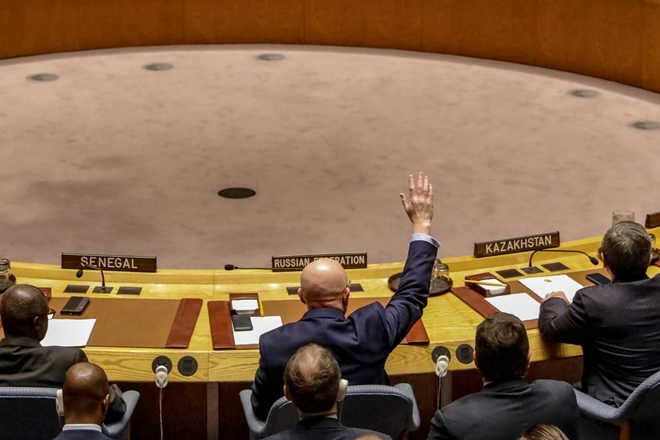Syria toxic gas inquiry to end after Russia again blocks U.N. renewal
 |
| Russian Ambassador to the United Nations Vasily Nebenzya votes against a bid to renew an international inquiry into chemical weapons attacks in Syria, during a meeting of the U.N. Security Council at the United Nations headquarters in New York, U.S., November 17, 2017. REUTERS |
In the past two years, the joint U.N. and the Organization for the Prohibition of Chemical Weapons (OPCW) inquiry has found the Syrian government used the nerve agent sarin in an April 4 attack and has also several times used chlorine as a weapon. It blamed Islamic State militants for using mustard gas.
Russia vetoed on Friday a Japanese-drafted U.N. Security Council resolution to extend the inquiry for one month. It was an eleventh-hour bid to buy more time for negotiations after Russia blocked U.S.-drafted resolutions on Thursday and Oct. 24 to renew the investigation, which the council created in 2015.
Syrian ally Russia has cast 11 vetoes on possible Security Council action on Syria since the country’s civil war began in 2011. The Japanese draft received 12 votes in favor on Friday, while China abstained and Bolivia joined Russia to vote no.
After Friday’s vote, the council moved to closed-door discussions at the request of Sweden’s U.N. Ambassador Olof Skoog to “ensure we are absolutely convinced we have exhausted every avenue, every effort” to try and renew the investigation.
After a brief discussion, Italian U.N. Ambassador Sebastiano Cardi, council president for November, told reporters: “The council will continue to work in the coming hours and days, constructively, to find a common position.”
Russian U.N. Ambassador Vassily Nebenzia told the council earlier on Friday that the inquiry could only be extended if “fundamental flaws in its work” were fixed. He said that for the past two year the investigators had “rubber-stamped baseless accusations against Syria.”
The council voted on a rival Russian-drafted resolution on Thursday to renew the inquiry, but it failed after only garnering four votes in favor.
A resolution needs nine votes in favor and no vetoes by the United States, France, Russia, Britain or China to be adopted.
“Russia is wasting our time,” U.S. Ambassador to the United Nations Nikki Haley told the council on Friday.

